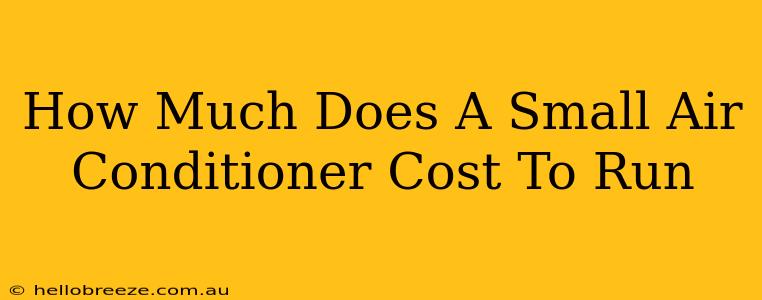Summer heat got you down? A small air conditioner can be a lifesaver, but before you plug one in, you're probably wondering: how much will this cost me? The truth is, the running cost of a small AC unit varies greatly depending on several factors. Let's break it down so you can get a better idea.
Factors Affecting Your Small AC's Running Costs
Several key elements influence the monthly electricity bill impact of your small air conditioner. Understanding these will help you make informed decisions and potentially save money.
1. Size and Efficiency of the Unit:
This is arguably the biggest factor. A smaller, more efficient unit (measured in BTU/h or EER/SEER rating) will consume less energy than a larger, less efficient one. Look for high Energy Star ratings – these indicate superior energy efficiency. Higher SEER ratings mean lower operating costs. A small window unit, for example, will generally cost less to run than a portable AC of the same cooling capacity.
2. Your Local Electricity Prices:
Electricity costs vary significantly by location. Check your electricity bill to determine your kilowatt-hour (kWh) rate. This rate directly impacts your overall running cost. Higher kWh rates mean higher operating costs.
3. Usage:
The more you use your air conditioner, the higher your electricity bill will be. If you only need it for a few hours a day on particularly hot days, your cost will be significantly lower than if you run it constantly. Consider using it strategically – during peak heat only, and setting it to a reasonable temperature.
4. Ambient Temperature:
The hotter it is outside, the harder your AC has to work, thus increasing energy consumption. On excessively hot days, expect higher running costs. Pre-cooling your home before the hottest part of the day can help mitigate this.
5. Maintenance:
A well-maintained air conditioner will run more efficiently. Regular filter cleaning and professional servicing can prevent costly repairs and improve energy efficiency, saving you money in the long run.
Estimating Your Running Costs: A Simple Calculation
While a precise calculation requires specific details about your unit and electricity rates, here's a simplified approach:
- Find your AC's power consumption: This information (in watts or kilowatts) is usually found on a sticker on the unit itself.
- Convert watts to kilowatts: Divide the wattage by 1000.
- Calculate daily energy consumption: Multiply the kilowatt rating by the number of hours you run the unit daily.
- Calculate monthly energy consumption: Multiply your daily energy consumption by the number of days in the month.
- Calculate monthly cost: Multiply your monthly energy consumption by your electricity price per kWh.
Example: A small AC unit uses 500 watts (0.5 kW) and runs for 5 hours a day. With a kWh rate of $0.15, the daily cost is roughly $0.375, and the monthly cost (30 days) is about $11.25.
Saving Money on Your Small AC's Energy Consumption
Here are several tips to minimize the operating cost of your small air conditioner:
- Choose a high SEER-rated unit: Invest in energy efficiency for long-term savings.
- Clean or replace filters regularly: This improves airflow and efficiency.
- Seal windows and doors: Prevent cool air from escaping.
- Use window coverings: Keep direct sunlight out.
- Set the thermostat higher: A few degrees can make a big difference.
- Use a programmable thermostat: Automate temperature adjustments for optimal energy use.
- Consider a smart thermostat: These can learn your habits and further optimize energy use.
By understanding the factors that affect the running cost of a small air conditioner and employing energy-saving strategies, you can enjoy cool comfort without breaking the bank. Remember to always consult your user manual for specific details on your unit’s energy consumption.

